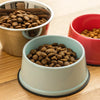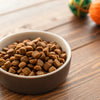Will Dry Cat Food Hurt a Dog? Understanding the Risks and Nutritional Differences
- Houndsy
Table of Contents
- Introduction
- The Nutritional Landscape: Dog Food vs. Cat Food
- What Happens If My Dog Eats Cat Food?
- How to Keep Dogs from Eating Cat Food
- The Role of Pet Food Design
- What to Do If Your Dog Accidentally Eats Cat Food
- Conclusion
Introduction
If you're a pet owner with both dogs and cats, you've likely encountered a situation where your dog sneaks a bite of cat food. This scenario is more common than you might think—statistics show that around 70% of pet owners with multiple pets have witnessed this behavior. But as adorable as it may seem, the question lingers: will dry cat food hurt a dog? The answer is nuanced and requires an understanding of the differences in canine and feline nutrition, as well as the potential health implications for our furry friends.
In this blog post, we aim to demystify the complexities surrounding pet nutrition, particularly focusing on the interaction between dog food and cat food. By the end of this article, you will learn about the nutritional differences between dog food and cat food, the potential risks associated with dogs eating cat food, and practical strategies to keep your dog safe and healthy. We invite you to reflect on your own feeding practices and consider the best choices for your pets.
Our thesis is clear: while an occasional nibble of dry cat food is unlikely to cause significant harm to most dogs, regular consumption can lead to various health problems. Therefore, understanding the differences in pet nutrition and taking proactive measures to prevent cross-feeding is essential for maintaining your dog's health.
The Nutritional Landscape: Dog Food vs. Cat Food
The Basics of Pet Nutrition
At its core, pet nutrition revolves around the specific dietary needs of different species. Dogs are omnivores, which means they thrive on a diet that includes both animal and plant-based ingredients. Cats, in contrast, are obligate carnivores, requiring a meat-based diet to meet their nutritional needs. This fundamental difference in dietary requirements sets the stage for understanding why cat food can be problematic for dogs.
Key Nutritional Differences
-
Protein and Fat Content:
- Dog Food: Typically contains a minimum of 18% protein and 5.5% fat.
- Cat Food: Higher in both, with around 26% protein and 9% fat, catering to a cat's need for more protein and energy.
-
Essential Nutrients:
- Taurine: An amino acid crucial for heart health, present in cat food but absent in dog food.
- Arachidonic Acid: Required for cats but not for dogs, as dogs can synthesize it from other fats.
- Vitamins: Cats require higher amounts of certain vitamins, such as Vitamin A, which they cannot convert from plant sources as dogs can.
-
Carbohydrate Levels:
- Cat food often has higher carbohydrate content, which can contribute to obesity in dogs if consumed in excess.
These differences highlight that while dogs may enjoy the taste of cat food, the nutritional imbalance can have serious health implications.
Implications for Health
Feeding a dog cat food on a regular basis can lead to various health issues, including:
- Gastrointestinal Upset: Cats are better equipped to digest high-protein, high-fat diets, while dogs may experience diarrhea or vomiting from such foods.
- Obesity: The higher calorie density in cat food can lead to weight gain in dogs, especially if they are not very active.
- Pancreatitis: A serious condition that can arise from the high fat content in cat food, leading to inflammation of the pancreas.
What Happens If My Dog Eats Cat Food?
Occasional Consumption
If your dog happens to sneak a few kibbles of cat food, the immediate consequences are usually minimal. Most healthy dogs can tolerate small amounts of cat food without severe issues, but this should not become a habit. The key is moderation, and occasional indulgence is unlikely to pose a significant risk.
Signs of Distress
In cases where a dog consumes a larger quantity of cat food, you may notice symptoms such as:
- Vomiting
- Diarrhea
- Abdominal discomfort
- Lethargy or weakness
If your dog exhibits any of these symptoms after eating cat food, it is crucial to monitor them and consult a veterinarian if the symptoms persist for more than 24 hours.
Long-Term Effects
The long-term effects of consuming cat food can be detrimental, especially for dogs with pre-existing health conditions, such as:
- Pancreatitis: Dogs prone to this condition should avoid high-fat diets like cat food altogether.
- Kidney Disease: Increased protein can exacerbate kidney issues, making it crucial for affected dogs to stick to their prescribed diets.
How to Keep Dogs from Eating Cat Food
Practical Strategies
Given the potential risks associated with dogs eating cat food, here are some practical tips to help prevent this behavior:
- Feed Separately: Create designated feeding areas for your cat where your dog cannot access the food. This could involve feeding your cat in a separate room or using baby gates to block off access.
- Elevate the Cat’s Food: Place the cat’s food on a higher surface, such as a counter or cat tree, where dogs cannot reach.
- Timing Is Key: Feed your pets at different times to minimize the opportunity for your dog to snatch cat food.
- Train the “Leave It” Command: Teaching your dog to ignore the cat food can be beneficial for their training and health. Reinforce this command with positive rewards.
- Use Pet-Proof Containers: Store cat food in containers that are difficult for dogs to access, preventing them from sneaking bites when you're not looking.
The Importance of Communication
Communicate with family members about the importance of keeping cat food out of reach of dogs. Establishing a household rule can help maintain consistency and minimize the risk of cross-feeding.
The Role of Pet Food Design
At Houndsy, we understand that convenience and aesthetics play a crucial role in pet care. Our flagship product, the Houndsy Kibble Dispenser, not only ensures that your dog receives the right amount of food but also enhances your home decor with its elegant mid-century modern design. With a large storage capacity of 25–30 lbs and features like a BPA-free liner and an auto-locking mechanism, feeding your dog becomes a seamless part of your routine.
Explore our Houndsy Kibble Dispenser here.
What to Do If Your Dog Accidentally Eats Cat Food
If you discover that your dog has indulged in cat food, here’s a step-by-step guide on what to do:
- Observe for Symptoms: Keep an eye on your dog for any signs of distress, such as vomiting or diarrhea.
- Consult Your Veterinarian: If your dog shows any concerning symptoms or if they've consumed a large quantity of cat food, do not hesitate to reach out to your veterinarian for advice.
- Hydration: Ensure your dog has access to fresh water to help flush out any potential irritants.
- Monitor Their Diet: If your dog has a history of gastrointestinal issues, consider withholding food for a meal or two before returning to their regular feeding schedule.
Conclusion
In conclusion, while dry cat food is not inherently toxic to dogs, it poses several risks if consumed regularly. Understanding the nutritional differences between cat food and dog food is essential for pet owners who share their homes with both species. By taking proactive measures to separate feeding routines and ensuring that our dogs receive nutritionally balanced meals, we can safeguard their health and well-being.
As we navigate the complexities of pet ownership, it’s vital to remain attentive to our pets' dietary habits. Consider investing in products that enhance the feeding experience, like our Houndsy Kibble Dispenser, which simplifies portion control and ensures your dog receives the right nutrition consistently. Order now.
FAQ
Can dogs eat cat food occasionally?
Yes, small amounts of cat food are generally safe for dogs, but it should not be a regular part of their diet.
What should I do if my dog eats a lot of cat food?
Monitor for symptoms like vomiting or diarrhea. If symptoms persist, consult your veterinarian.
Why do dogs like cat food so much?
The higher protein and fat content in cat food make it more appealing to dogs, as they are attracted to the stronger flavors.
Can puppies eat cat food?
Feeding cat food to puppies is not recommended as it does not provide the balanced nutrition they need for healthy growth.
How can I prevent my dog from eating cat food?
Separate feeding areas, elevate cat food, and use training techniques to discourage dogs from accessing cat food.
By understanding the intricacies of pet nutrition and implementing effective feeding practices, we can ensure our furry companions lead healthy and happy lives.












